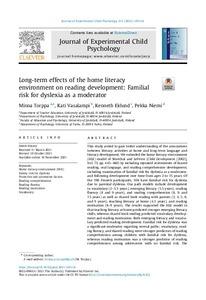Long-term effects of the home literacy environment on reading development: Familial risk for dyslexia as a moderator
Torppa Minna; Vasalampi Kati; Eklund Kenneth; Niemi Pekka
Long-term effects of the home literacy environment on reading development: Familial risk for dyslexia as a moderator
Torppa Minna
Vasalampi Kati
Eklund Kenneth
Niemi Pekka
ELSEVIER SCIENCE INC
Julkaisun pysyvä osoite on:
https://urn.fi/URN:NBN:fi-fe2022081154414
https://urn.fi/URN:NBN:fi-fe2022081154414
Tiivistelmä
This study aimed to gain better understanding of the associations between literacy activities at home and long-term language and literacy development. We extended the home literacy environment (HLE) model of Senechal and LeFevre (Child Development [2002], Vol. 73, pp. 445-460) by including repeated assessments of shared reading, oral language, and reading comprehension development, including examination of familial risk for dyslexia as a moderator, and following development over time from ages 2 to 15 years. Of the 198 Finnish participants, 106 have familial risk for dyslexia due to parental dyslexia. Our path models include development in vocabulary (2-5.5 years), emerging literacy (5.5 years), reading fluency (8 and 9 years), and reading comprehension (8, 9, and 15 years) as well as shared book reading with parents (2, 4, 5, 8, and 9 years), teaching literacy at home (4.5 years), and reading motivation (8-9 years). The results supported the HLE model in that teaching literacy at home predicted stronger emerging literacy skills, whereas shared book reading predicted vocabulary development and reading motivation. Both emerging literacy and vocabulary predicted reading development. Familial risk for dyslexia was a significant moderator regarding several paths; vocabulary, reading fluency, and shared reading were stronger predictors of reading comprehension among children with familial risk for dyslexia, whereas reading motivation was a stronger predictor of reading comprehension among adolescents with no familial risk. The findings underline the importance of shared reading and suggest a long-standing impact of shared reading on reading development both directly and through oral language development and reading motivation. (c) 2021 The Author(s). Published by Elsevier Inc. This is an open access article under the CC BY license (http://creativecommons.org/ licenses/by/4.0/).
Kokoelmat
- Rinnakkaistallenteet [27094]
